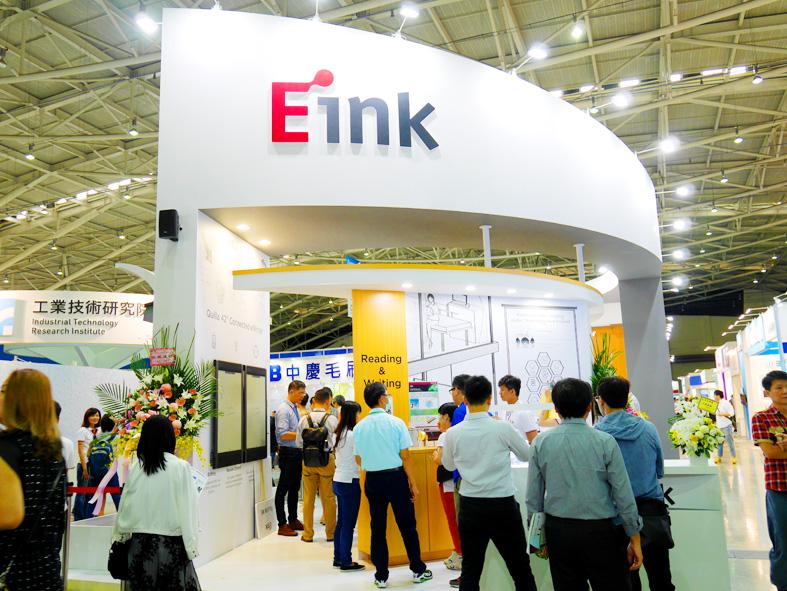E Ink Holdings Inc (元太科技) yesterday announced capacity expansion projects in Taiwan and China, as the world’s biggest e-paper display supplier aims to boost production of e-paper materials and flexible films.
The company plans to invest NT$3.31 billion (US$110.4 million) in Taoyuan’s Guanyin District (觀音) and 3.25 million yuan (US$479,400) at its Chinese facilities in Yangzhou, Jiangsu Province, it said.
The Hsinchu-based firm said its manufacturing capacity continues to be tight and it is unable to fully satisfy customer demand.

Photo: Chen Mei-ying, Taipei Times
Through 2024, the company plans to spend between NT$5 billion and NT$6 billion each year to fund those projects, it said.
“We are relatively positive about our business outlook,” E Ink chairman Johnson Lee (李政昊) told an online investors’ conference. “With more capacity coming online, we expect the third quarter would be better than the second quarter. The fourth quarter would also be better than the third.”
The anticipated sequential growth in revenue and net profit in the second half of the year comes as the world’s major retailers quicken pace in installing electronic shelf labels (ESLs), offsetting weakening demand for e-reader and e-note products, E Ink said.
Although consumers have turned cautious about spending on consumer electronics, including e-readers and e-notes, in the second half of the year, ESL demand remains strong, Lee said.
The shipments of e-reader modules could be 10 percent lower than E Ink’s estimates for this year, but they would still grow over last year, the company said.
More retailers are adopting ESLs rather than paper price tags to adjust prices automatically, Lee said, adding that ESL replacement demand remained strong.
“The ESL market is entering an organic growth phase. We believe it is still in an early stage of growth,” he said.
E Ink expects the penetration rate of ESLs to surpass 10 percent this year, compared with about 5 percent in the past few years.
The market could reach 30 billion or 40 billion units based on some customers’ calculations, he said.
E Ink posted a record-high net profit of NT$2.37 billion for last quarter, surging 71 percent from NT$1.39 billion a year earlier.
The company said it has seen a significant annual growth in e-reader shipments in the first half of this year.
The company’s first-half net profit expanded 50 percent year-on-year to NT$3.84 billion from NT$2.56 billion, while earnings per share rose to NT$3.36 from NT$2.26 a year earlier.

TAKING STOCK: A Taiwanese cookware firm in Vietnam urged customers to assess inventory or place orders early so shipments can reach the US while tariffs are paused Taiwanese businesses in Vietnam are exploring alternatives after the White House imposed a 46 percent import duty on Vietnamese goods, following US President Donald Trump’s announcement of “reciprocal” tariffs on the US’ trading partners. Lo Shih-liang (羅世良), chairman of Brico Industry Co (裕茂工業), a Taiwanese company that manufactures cast iron cookware and stove components in Vietnam, said that more than 40 percent of his business was tied to the US market, describing the constant US policy shifts as an emotional roller coaster. “I work during the day and stay up all night watching the news. I’ve been following US news until 3am

UNCERTAINTY: Innolux activated a stringent supply chain management mechanism, as it did during the COVID-19 pandemic, to ensure optimal inventory levels for customers Flat-panel display makers AUO Corp (友達) and Innolux Corp (群創) yesterday said that about 12 to 20 percent of their display business is at risk of potential US tariffs and that they would relocate production or shipment destinations to mitigate the levies’ effects. US tariffs would have a direct impact of US$200 million on AUO’s revenue, company chairman Paul Peng (彭雙浪) told reporters on the sidelines of the Touch Taiwan trade show in Taipei yesterday. That would make up about 12 percent of the company’s overall revenue. To cope with the tariff uncertainty, AUO plans to allocate its production to manufacturing facilities in

Six years ago, LVMH’s billionaire CEO Bernard Arnault and US President Donald Trump cut the blue ribbon on a factory in rural Texas that would make designer handbags for Louis Vuitton, one of the world’s best-known luxury brands. However, since the high-profile opening, the factory has faced a host of problems limiting production, 11 former Louis Vuitton employees said. The site has consistently ranked among the worst-performing for Louis Vuitton globally, “significantly” underperforming other facilities, said three former Louis Vuitton workers and a senior industry source, who cited internal rankings shared with staff. The plant’s problems — which have not

TARIFF CONCERNS: The chipmaker cited global uncertainty from US tariffs and a weakening economic outlook, but said its Singapore expansion remains on track Vanguard International Semiconductor Corp (世界先進), a foundry service provider specializing in producing power management and display driver chips, yesterday withdrew its full-year revenue projection of moderate growth for this year, as escalating US tariff tensions raised uncertainty and concern about a potential economic recession. The Hsinchu-based chipmaker in February said revenues this year would grow mildly from last year based on improving supply chain inventory levels and market demand. At the time, it also anticipated gradual quarter revenue growth. However, the US’ sweeping tariff policy has upended the industry’s supply chains and weakened economic prospects for the world economy, it said. “Now